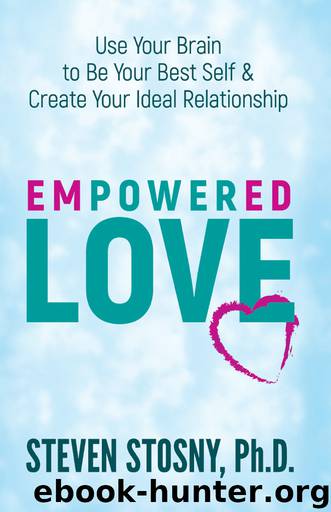Empowered Love by Steven Stosny

Author:Steven Stosny
Language: eng
Format: epub
Publisher: Dover Publications
Published: 2018-01-04T05:00:00+00:00
Threats of feeling unlovable and inadequate underlie complex jealousy. It’s imperative to use jealous feelings as a motivation to do whatever makes you feel lovable.
List behaviors that make you feel lovable (examples: acts of caring, nurturing, support, encouragement, compassion, kindness).
Overcoming Jealousy Log
Jealous feeling What I did to feel lovable
1 .
2 .
3 .
4 .
5 .
Jealous feeling How I connected with my partner
1 .
2 .
3 .
4 .
5 .
Once you’ve established your lists, practice the associations using the TIP technique for building new habits, as described in Chapter Thirteen (see page 147).
Resentment and the Laws of Emotional Bonds
Resentment in general stems from a perception of unfairness— you’re not getting something good you deserve, or you’re getting something bad you don’t deserve, or you perceive an unequal distribution of resources, praise, reward, or privilege. Of course, it’s a bit more complicated in love relationships. Most resentment in love arises from the guilt and shame of violating the Laws of Emotional Bonds. If you’re willing to go by self-report, what couples in committed relationships resent the most are things like unilateral decision making, management of resources (who spends how much on what, when, and where), division of labor and responsibility (work within and outside the home), sex, parenting, and in-laws. These things can certainly stimulate resentment, but they do not cause it.
The ultimate cause of resentment in love relationships is loss of the way we felt when falling in love. I don’t mean the rapture of Toddler-brain infatuation, which, though intense and often pleasant, is too unstable to endure. What we lose as resentment builds in love relationships is a cornerstone of the sense of self: feeling worthy of love. In the beginning, love relationships make us feel lovable. Regardless of our faults and foibles, we feel worthy of the love we receive. What we don’t realize is this:
It isn’t being loved that makes us feel lovable; it’s loving.
It’s a hard distinction to see most of the time. Being loved makes it so much easier to be loving that we can easily miss which provides the greater boost to self-value. Unless you feel lovable, feeling loved will not feel good, beyond a shallow ego stroke. It won’t feel good because it inevitably stirs guilt for getting something you don’t really feel you deserve and, worse, the shame of inadequacy, because you don’t feel able to return the love you get. The wellspring of resentment in love relationships is blaming this guilt and shame on our partners.
The great paradox of resentment in love relationships is that we feel entitled to something we don’t feel worthy of—not while we’re resentful. The more resentful we get, the more entitled and less worthy we feel.
If you’re resentful in a love relationship, you’re not getting much compassion, kindness, caring, support, or affection. It’s also a pretty good bet that you’re not giving very much of those things, at least not while you’re resentful. All you can do to improve the former is to invest more in the latter. That won’t
Download
This site does not store any files on its server. We only index and link to content provided by other sites. Please contact the content providers to delete copyright contents if any and email us, we'll remove relevant links or contents immediately.
Solve for Happy by Mo Gawdat(2106)
The Gravity Between Us by Kristen Zimmer(1754)
What I Need by J. Daniels(1718)
The Empath's Survival Guide by Judith Orloff(1663)
Stop Being Mean to Yourself: A Story About Finding the True Meaning of Self-Love by Melody Beattie(1653)
The Little Book of Lykke by Meik Wiking(1592)
The Emotionally Absent Mother by Jasmin Lee Cori(1536)
What a Time to be Alone by Chidera Eggerue(1419)
Jealousy by Osho(1411)
Anxious for Nothing by Max Lucado(1395)
Emotional Agility: Get Unstuck, Embrace Change and Thrive in Work and Life by Susan David(1362)
Who Says You Can't? YOU DO by Daniel Chidiac(1347)
Habits of a Happy Brain by Loretta Graziano Breuning(1281)
Think Happy to Stay Happy by Becca Anderson(1199)
Manipulation: A Guide to Mind Control Techniques, Stealth Persuasion, and Dark Psychology Secrets by Deborah Weiss(1199)
Persuasion: Learn Techniques in Manipulation, Dark Psychology, NLP, Deception, and Human Behavior by Tori Dasani(1141)
'74 & Sunny by A. J. Benza(1125)
A Liberated Mind by Steven C. Hayes PhD(1095)
When Pride Still Mattered by Maraniss David(1056)
